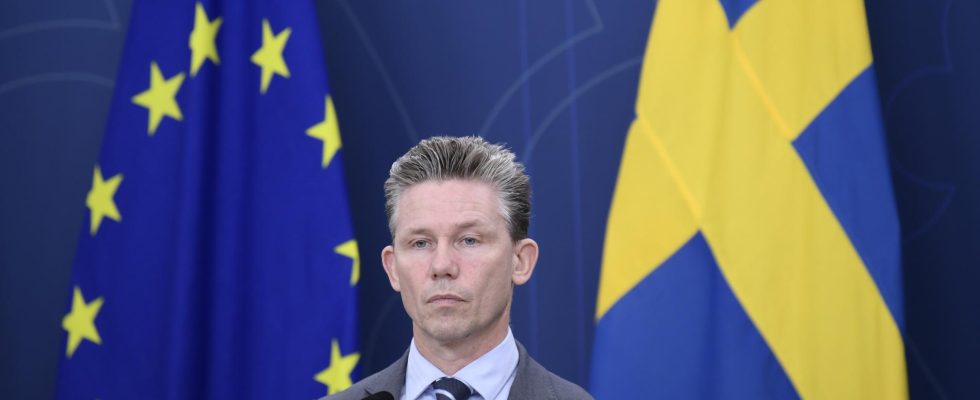Updated 12.35 | Published 12.26
Save the article
The governing parties share the view that the supply of ammunition can decide the war in Ukraine.
But the solution the industry is asking for is not on the table.
– We have no plans to establish state factories for ammunition production, says Defense Minister Pål Jonson (M).
On Friday, the government presented a new support package to Ukraine, which mostly contains artillery ammunition in 155 millimeter caliber.
The availability of artillery shells in particular has been singled out as potentially decisive in the war.
But representatives of the ammunition industry question whether the EU’s goal of donating 1 million artillery shells to Ukraine by spring is achievable.
– I don’t think you can handle it. I don’t think that million exists, says Björn Andersson, business development manager at ammunition manufacturer Nammo, in a report from the factory in Karlskoga.
– I think it is inevitable that Europe will run out of ammunition. The question is how long it will be empty.
Today, Nammo estimates that Europe’s combined industry produces 300,000–400,000 grenades a year. Ukraine pushes away over 2 million a year.
– I completely agree that we must strengthen the production of, among other things, artillery ammunition and create better outlets for this, says Defense Minister Pål Jonson.
One way he highlights is the government’s decision to classify ammunition as an “essential security interest”, which enables targeted direct procurement.
– I foresee that we will have to present a defense industry strategy in the future that also identifies different priorities in the defense industrial area, and we need to work on a European basis within the framework of the EU, and I know that there are various collaborations within NATO to strengthen the defense industrial base.
The question is whether it will be enough. The solution that Nammo advocates, that the state takes responsibility for building ammunition factories that the industry can run, is rejected by the Minister of Defence.
– Sweden made a choice in 1998, when we chose to privatize all of our defense industry. We chose to encourage it to enter the export market, and we also opened up foreign ownership. It is basically reforms that have been successful. Then, of course, you have to look on a case-by-case basis, how to proceed with these issues, but we have no plans to establish state-owned factories for ammunition production, says Pål Jonson.
Will we be able to supply what Ukraine needs in terms of artillery ammunition in the coming years? From Sweden’s or the EU’s side?
– I think that on a European basis we need to work more on these issues, and strengthen the defense industrial base. A strong defense industrial base is part of Sweden’s overall defense capability, says Pål Jonson.
Nor does Anna Starbrink, the Liberals’ defense policy spokesperson, envision state-owned factories.
– It is too early to answer that yet. But I think we need to have a dialogue with the defense industry about how we can increase production. It’s about them feeling that if you increase with several production lines, you also have to know that there is a long-term perspective, so that you have the opportunity to invest. There is certainly something we can do more from Sweden’s side, says Anna Starbrink.
Mikael Oskarsson, the Christian Democrats’ defense policy spokesperson, would like to see a new ammunition factory in Sweden, but without government involvement.
– It is quite clear that it is really important that the pace of production increases and that new production opportunities open up both in Europe, but not least in Sweden, says Mikael Oskarsson (KD).
The numbers still speak a clear language.
There will come a time, probably quite soon, when there is neither inventory nor production capacity left to support Ukraine with.
A situation that could be decisive in the war.
– That image is probably shared by many. I hear that when we discuss with representatives of other countries. The lack of ammunition is the most critical issue. There, Sweden and other countries need to do what we can to increase it. Now we make this decision today, and so we have to work further to get more ammunition in place in various ways, together with the industry, says Anna Starbrink.
